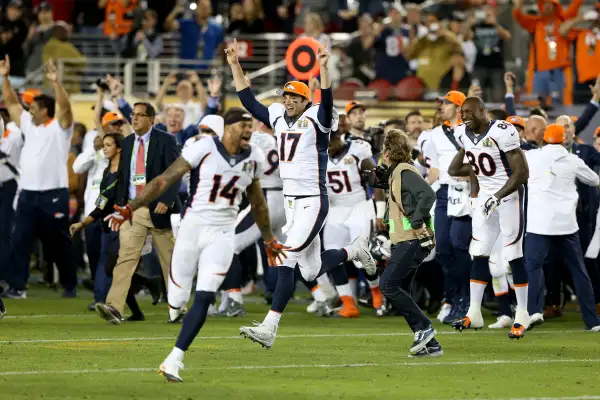Here's How Much Money Every Member of the Broncos Got for Winning the Super Bowl

Professional football players may not need any extra motivation to play as hard as they can in the regular season and beyond. They've devoted their lives to the game, and they want to win on the biggest stage. Yet those who make it to the post-season have some special motivation in the form of fat bonuses that balloon the further their teams make it in the playoffs.
To kick off the post-season in the Wildcard round, where division winners play the wildcard teams, the payday is relatively mild. Each member of the division winner team gets $25,000 to participate, while wildcard team players get $23,000 apiece.
For the Division Playoff, players get another $25,000 per game. What's interesting is that players on teams that had good enough records to get byes and avoid the first Wildcard round are suffer a financial penalty because they lose the opportunity to get a bonus by playing in the opening round. Basically, their success in the regular season costs each player on the team $25,000. On the bright side, they get home field advantage and a solid week of rest--which gives them a better shot at the next, bigger pile of cash, so it shakes out.
At the Conference Championship level, players get a fatter $46,000 bonus for playing.
And if you make it to the Super Bowl, you get $51,000 for your trouble if you lose, and $102,000 if you win.
In this Superbowl 50, the winners (either the Denver Broncos or Carolina Panthers) will have taken home $174,000, and the losers will still have won $122,000—neither of them had to play in the first round. Not too shabby.
This money is allocated from an NFL post-season pool, not the individual teams, but you can be sure that the deal is a little sweeter than $174,000. Built in to many player contracts is some significant padding: Just for making it to the Super Bowl, for instance, Peyton Manning got $2 million, representing over 13% of his salary, according to Sports Illustrated. And if Manning adds another ring to his collection? Another $2 million for Peyton. Plus endorsements.
Read next: The Super Bowl's 2 Quarterbacks Are Tops in the NFL for Endorsements
The rules as to who get these bonuses are a little complex. On the lowlier side of things, practice squad members don't get paid bonuses, but they do get paid at least their minimum weekly salary of $6,600 for the longer season, former agent John Corry wrote on CBS Sports's website.
For the Wildcard and Division Playoff rounds, all players on the Active List, Inactive List, or Injured Reserve List get paid.
For the Conference Championship and Super Bowl, things get crazy complicated.
According to Corry's decoding of the extreme complicated system outlined in the NFL Players Association agreement, a player gets the full bonus if they:
- Players on the 53-man roster for the game in question and the previous three games, including the post-season
- Played in at least eight games for the team that season and aren't contracted to another team
- Are an injured veteran player (one year of tenure) who was put on the injured list during the season
- Are an injured four-year veteran who went on the injured list in the pre-season
Another group of players get half the bonus for the Superbowl and Conference Championship if they fall under a different set of parameters--if, for instance, they were on the 53-man roster for the game in question less than the previous three games, including the post-season, or if they are one-year veteran players who were injured in the pre-season.
Now you understand why these guys have agents.